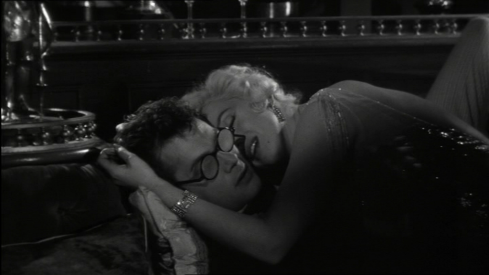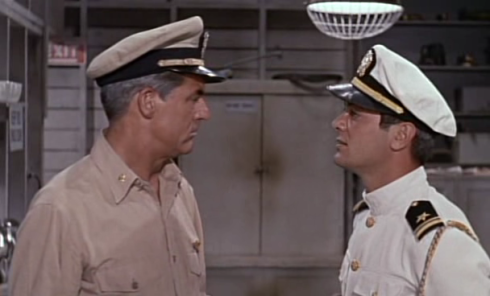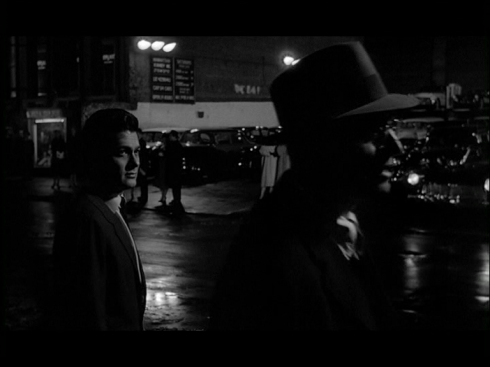You are currently browsing the tag archive for the ‘kirk douglas’ tag.
Some Like It Hot (1959)
On the 23rd of April I attended a screening of Some Like It Hot. The film was as funny and sharp as I remembered it, perfectly paced and performed amidst its rich narrative, effortlessly shifting from authentic gangster picture to masterful comedy.
On this occasion all eyes were on the performance of Tony Curtis, and the closer you watched him – particularly his Cary Grant impression as a millionaire oil tycoon – the more convinced you became of his skillful comic timing. In essence he played it straight against Jack Lemmon’s more explicitly comic performance (broad gestures and faces). Indeed, Curtis hardly smiles throughout the whole film.
The atmosphere of the gangster opening is so convincing that if it had continued as a gangster movie I’m sure it would have ended up as a classic of the genre. Of course director Billy Wilder dominated such a variety of genres with films such as The Lost Weekend (1945), Double Indemnity (1944) and Sunset Boulevard (1950), and he could have clearly made a killer gangster film if he had wanted to.
He certainly had a love for the gangster films of the 30s, as is evident in the knowing casting of Pat O’Brian as the police chief – who had starred alongside Cagney in 1930s films such as Angels With Dirty Faces (1938) – and also George Raft as the mob boss Spats, an actor made famous by one of the templates of the genre, Scarface (1932). In that film Raft famously flipped a coin menacingly; in Some Like It Hot he comes across a young guy in the hotel lobby flipping a coin and he asks, ‘Where did you learn that cheap trick?’
The chemistry between Lemmon and Curtis is so natural, and Marilyn sparkles. She had an acute understanding of how to use her face, body and voice to induce a sex appeal that seductively permeated through the screen; men certainly connected with it. And no more than in this film in which she drapes herself over Tony Curtis’s duplicitous character, kissing him with a soft and delicate passion, and is found on stage singing ‘I Want To Be Loved By You’, punctuating her lines with an enticing vocal shrill.
Tony Curtis On Stage
After the movie ended there was excitement. We were offered two scenes from other films, one from The Defiant Ones (1958) and the other from The Sweet Smell of Success (1957) (bottom). The crowd stirred, talked loudly, and when it was announced that the evening’s guest was on the way the audience held their breath. He was emerging from the door by the stage when the spotlight hit him and the room erupted instantly into applause that quickly transformed into a standing ovation.
It is certainly a unique experience watching a young man on-screen, as vivid and alive as if he were in the room, and then to be confronted by the very same man, now older, and in that same room. For a moment it was difficult to connect the two images of Tony Curtis. One was boyish, handsome, with his trademark thick black hair; the other was an old man who moved slowly, who no longer had any.
But it was the moment he began to speak that the two images came together. He was a very articulate speaker who was also fresh, funny and enthusiastic, and he did not need a cue from the interviewer to speak. He was more than happy to reminisce freely about the movie stars he worked with, and about his memories and experiences, all in his famous husky New York accent.
Marilyn
He talked a lot about Marilyn Monroe, about how he knew her around 1950 and was her lover for three years. He recalled how he picked her up and drove her through Hollywood in his open-top car, adjusting the rear-view mirror so that he could see the red-haired Marilyn in the backseat. They were essentially each other’s first love, and he talked of the thrill of discovering women for the first time through Marilyn. A love affair with Marilyn Monroe is now an almost abstract concept, but it was a very real one for Tony Curtis.
He described the first time he and Marilyn spent the night together. He had taken her to a friend’s beach-side house where the waves were constantly lapping and he cooked her steak on the outdoor grill. She didn’t say a word about the sand on her steak, and neither did he. He paused the flow of his story, almost sidetracked by a far more powerful and succinct thought. All he said was, ‘I loved making love to Marilyn.’ This received a round of applause from an audience who almost did not know how to comprehend such a blunt yet powerful statement. The applause was triggered by the thrill of hearing that line coming from someone who could say it and mean it, but it soon transformed into a kind of congratulations on the audience’s part, as if to say, ‘Well done.’
Burt Lancaster, Kirk Douglas and Cary Grant
He was asked about his mentors and contemporaries Burt Lancaster and Kirk Douglas. He spoke affectionately of Lancaster and how he brought his powerful real-life personality to his on-screen roles. He was asked about Douglas, but also how it was to work with Stanley Kubrick. ‘Kirk Douglas is tough,’ said Curtis, ‘but Stanley Kubrick was tougher.’ He really meant it when he told us that Kubrick really made them work hard on Spartacus (1960).
Cary Grant was his idol. He had watched his movies as a young man and observed the way he moved and spoke, how he handled props and especially how he handed women. In later life Curtis had the chance of working with him and he was very aware of the circle that his life had taken around Cary Grant. At 16 he had headed into war on a submarine. He said he did so because of Destination Tokyo (1943), the Cary Grant submarine movie. He used to sit on the submarine and imagine Cary Grant coming around the corner. Then when time went by and he ended up in the submarine movie Operation Petticoat (1959) (below) Cary Grant actually did come around the corner.
Cary Grant was very supportive of him when he began in movies; Curtis took down a poster of Cary Grant off the wall outside a cinema and took it to Cary Grant to sign. In recalling the supportive message that Grant wrote for him Curtis was clearly moved, having to pause his story for a brief moment.
It was entirely Curtis’s idea to imitate Cary Grant in Some Like It Hot, and it was only something that they began working with very close to shooting, if not on the set itself. Curtis was happy to repeat his Cary Grant impression for the audience, who were naturally thrilled. When Billy Wilder screened the film for Cary Grant his verdict was: ‘No-body-talks-like-that!’
Elvis and Sinatra
Curtis was asked about Elvis, who had modeled his famous hairstyle on Curtis’s. He recalled how when walking through the studio lot one day Elvis suddenly pulled him into his trailer. The ‘boy’ talked excitedly:
Elvis: I just want you to know how much of a fan I am of yours, Mr. Curtis.
Tony: Don’t call me Mr. Curtis.
Elvis: What should I call you, then?
Tony: Just Tony.’ (pause) What should I call you?
Elvis: Mr. Presley.
It sounded like they were good friends and that they enjoyed each other’s company. Curtis added that they would ‘share’ girls, though did not clarify what this actually meant.
Curtis revealed that Frank Sinatra had the greatest music system money could buy – ‘Well he should, he’s Frank Sinatra’, he added, and that music would play all day at Sinatra’s place. Except it was Sinatra’s own records that would play. Even when with a woman he would continue to play his own music. Curtis relayed how Sinatra then once asked a lover, ‘So, how was it?’ She replied: ‘Well, the music was good.’
Universal, leading ladies, and some very good advice
Curtis painted a really vivid portrait of how it was to work during the 50s in Hollywood, mentioning an early role as a bellboy on a Barbara Stanwyck movie. Although it was a one-scene, one-line role, the director gave him advice that would stick with him throughout his career. Talking of the bellboy character who was to hand Barbara Stanwyck a letter, the director confided: ‘All you want is a tip.’ When Curtis entered the hotel room he had all the motivation he needed to give a really authentic performance.
Curtis revealed something that was very interesting to me: Universal was inferior to the other studios, and was perceived so by the industry and by those actually working in Universal pictures. They did not have a powerful head like the other studios and they produced movies cheaply for a quick profit. Generally we do not see movies as the product of studios, nor do we categorise them by studio. But studios are probably more of a defining factor of a film’s look, feel and story than we think.
It was revealed that Curtis’s favourite film as a child was The Adventures of Robin Hood (1938) with Errol Flynn. When asked who his favourite leading ladies were he named Janet Leigh right away (which received a round of applause); of course Curtis was once married to Leigh.
He also mentioned Natalie Wood who he worked with on The Great Race (1965), a film in which he was re-teamed with Jack Lemmon. This turned about to be his favourite performance of all. He particularly loved the fencing sequence in which he swordfights with his shirt off, as well as the pie-throwing scene in which he did not get a single pie on his perfect white suit during filming (because of this they had to recreate the set and reshoot him being splattered individually).
He also gave us some really great advice: ‘don’t believe the stories you hear about the movies, make up your own minds’. Curtis told us how so much that has been written on Hollywood has been made up by writers and journalists. And he must know from experience and from what he has read about himself and his contemporaries. This is important advice for us all: question who is writing, for what purpose, and keep a critical mind, particularly with film history and criticism.
Tony Curtis was full of life. During the evening he had clearly loved making the audience laugh and effortlessly played off the rapport he had created with the audience. Funny, charismatic and very appreciative of the audience, it took him a while to leave due to the incredible power of the applause during the final standing ovation.






